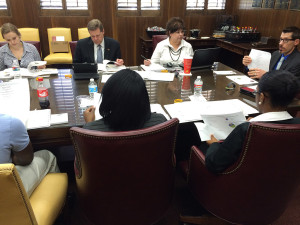
The student service fee allocation committee met in the Hardin boardroom on April 4 to hear requests for funding from non-academic departments that serve students. Representatives from student development, recreational sports and other departments spoke in front of the committee of five voting students led by Matthew Park, associate vice president for student affairs and dean of students, as well as non-voting faculty and administrative advisers.
“Myself, Dr. Lamb, Dr. Fowle, and members of the faculty serve only in an advisory capacity. Students are the ones paying the student service fees, which total more than $2.2 million during a fiscal year,” Park said.
Keith Lamb, vice president of student affairs and enrollment management, said he and Marilyn Fowlé, vice president of business affairs and finance, advise the student committee based on their historical perspective and Fowlé’s experience with the budget.
“My role is more consistency than anything, being the constant of the process over the years and students and faculty rotate through,” Lamb said. “If the students are in a real difficult spot making decisions, and if they so request my input, I’ll give them my input.”
Alex Petree, mechanical engineering senior and member of the voting committee, said he and the other student members must consider a multitude of variables before the allocations are finalized.
“We’ve got to keep the students in mind. We have a couple thousand less than what’s requested, so we’ve got to figure out how to cut that down,” Petree said. “You’ve got to figure out which department needs the money more than the others and we have to take into account how they’re going to spend their money and whether it’s crucial. Part of it goes to the faculty, too, to pay their salaries, so that’s important too.”
Lamb said those required allotments for salaries make the students’ job even harder.
“They have the liberty to shift money around if they want to, although that’s easier said than done because so much of these funds are tied up in salaries. A lot of these departments that are funded from student service fees pay salaries, pay benefits,” Lamb said. “Although it sounds easy to shift money around, in reality it’s not once you start considering salaries and the impact that has on people.”
Despite these obstacles, Park said the committee was able to increase the budget of some departments without cutting any others.
“The committee’s strategy essentially involved looking at how much each department or program was awarded this year and what they requested next year. Then, based on the students’ priorities and information provided during the presentations and Q&A, the committee recommended some budgets be increased in varying amounts while others remained flat. I thought they did a fantastic job,” Park said.
Because the student service fee is based on semester credit hours, the fund cannot increase until enrollment increases, which it hasn’t in six years. Lamb said declining enrollment results in the difficult decision of cutting money from some groups, but according to Park, this year’s flat enrollment is actually easy for the committee to handle.
“Flat enrollment is much easier to deal with compared to declining enrollment. In contrast to previous years, the committee was not required to cut the amount of funds departments and organizations had received this year,” Park said.
Joey Greenwood, director of recreational sports and the Wellness Center, asked for $12,000 to buy new equipment for recreational sports.
“Last year I requested the same amount of money that I’m asking for the increase this year and I didn’t get exactly what I asked for last year. It was around $3,000 less. If we can get that $12,000 we can secure the new equipment we need to get us through the year,” Greenwood said. “It benefits rec sports indirectly but directly free play because we can have good equipment for free play and new equipment for rec sports. We can go buy those orange rubber basketballs for probably $8 a piece, but people aren’t going to use them.”
Dirk Welch, director of the Career Management Center and testing services, said his department mainly serves students, but alumni can take advantage of the Career Management Center’s services as well.
“Our services, while student service fees fund us for working with students, we don’t charge alumni and there isn’t an alumni service fee money,” Welch said.
Welch asked for an $8,000 increase from this year to cover wages for graduate assistants in his department.
“To make the experience for graduate assistants that are working on campus similar across campus to what they receive in graduate research position, teaching position or with another academic departments,” Welch said. “For us to not lose the workforce that we have without cutting back on hours, we need to be able to match those positions, and we don’t have a discretionary pool of money just in our account.”














